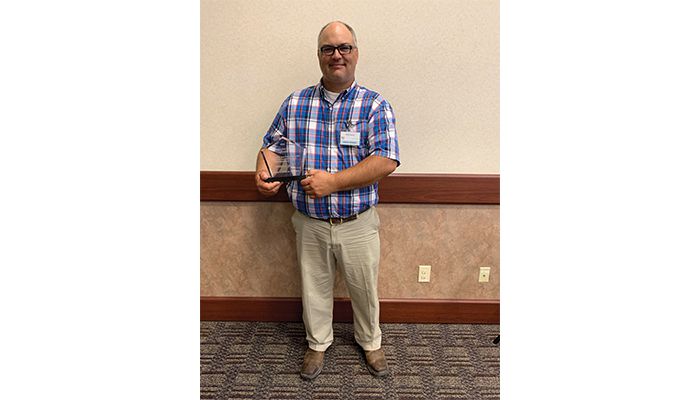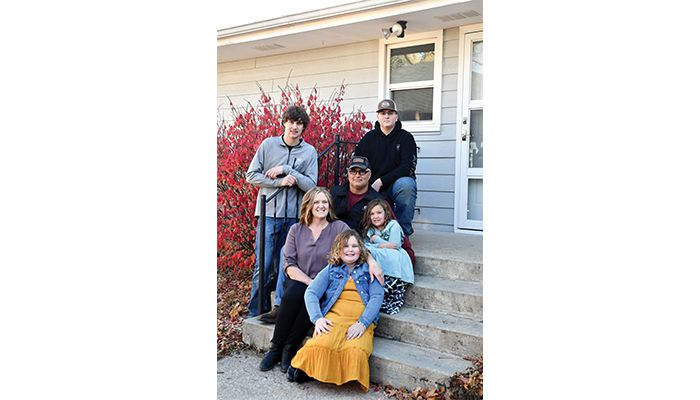Kading’s conservation ethic runs deep
Author
Published
4/1/2024
Casey farmer follows in his grandfather’s footsteps as a county Soil and Water Conservation District commissioner.
Conservation is in Phil Kading’s blood.
His grandfather, Norm Kading, served as an Adair County Soil and Water Conservation District (SWCD) commissioner for 33 years, holding statewide office for a time.
Phil is in his fourth year as a SWCD commissioner and winner of last year’s Ken Wagner Award, given by the Conservation Districts of Iowa to a beginning commissioner with five years or less experience.
“I have a way to go to hit my grandfather’s record of service,” Kading says.
But he has learned his lessons well.
“I started farming when I was in the eighth grade,” says Kading. “My dad and grandpa taught me how to farm, and how to farm right. They taught conservation.”
As a Soil and Water Conservation District commissioner, Kading is one of five elected representatives who set local priorities for natural resources protection in Adair County.
They work with the U.S. Department of Agriculture’s Natural Resource Conservation Service (USDA-NRCS), Iowa Department of Agriculture and Land Stewardship (IDALS) and Pheasants Forever to increase local awareness of natural resource concerns and opportunities.

Pictured above: Phil Kading.
Conservation oversight
Meeting a few hours each month, they approve new projects developed with SWCD office staff, approving cost-share applications and ensuring applicants’ conservation plans are up to par on all their farms.
“The conservation scene is changing,” Kading says. “Farms are bigger. There are less people. No-till has become popular to help prevent soil loss. Cover crops are part of the nutrient reduction plan.”
He says farmers are enhancing their water resources by building ponds, a trend he likes to see.
Conservation in practice
Emphasizing soil and water conservation isn’t just a once a month gig for Phil. He puts the concepts to practice on his own farm near Casey, beginning with judicious use of applied inputs.
“I don’t like to overapply,” says Phil. “and with today’s technology there is really no need to.” He is concerned about both water quality and his farm’s bottom line. “We drink that water, and the excess that runs off costs money.”
He farms a bit under 1,000 acres, with 300-400 of that in hay. “A lot of the bigger farmers don’t want to deal with hay, and our land works for it,” he says.
He utilizes strip farming, with contour terraces of corn or beans alternating with hay. They have no-tilled most of their fields since the late 1970s. “We do till some, mostly before planting oats that come before alfalfa in our rotation. It smooths off and levels the field so we can move faster across the field.”
He has started experimenting with cover crops, but mostly relies on his heavy hay acreage to serve the same purposes.
Still learning
The next generation is about to make its mark on the Kading farm. With Phil’s dad retiring, he has been renting the farm ground to Phil and is selling his cattle on contract to Phil’s son, now a junior in high school. Phil has 3 more younger kids learning conservation-based farming practices in real life.
In his dual roles of SWCD commissioner and farmer, Phil, too, continues to learn – about the carbon pipeline, about options for growing switchgrass, about new technology and farming practices, and keeping water clean.
He would rather see farmers adopt conservation practices voluntarily than have them tied to crop insurance through the Farm Bill. “It just seems to work better when it’s voluntary, not mandatory,” he says.
At age 44, Phil says he has learned a lot in his years of farming: “I’ve learned that I don’t always do everything perfect, and that it pays to listen. I’ve learned that digging in your heels in the tough times builds character. I learned to farm right, and do a good job, and to protect your natural resources. And I keep learning every day.”

Pictured above: The next generation of Kadings is already making their mark on the farm and learning good conservation practices. Phil Kading and his wife, Leanne, farm with their children William, 17; Carson, 14; Kenzie, 10; and Caroline, 5. PHOTO CONTRIBUTED
Queck-Matzie is a freelance writer from Greenfield.
Want more news on this topic? Farm Bureau members may subscribe for a free email news service, featuring the farm and rural topics that interest them most!